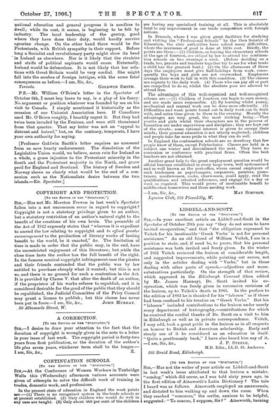CONTINUATION SCHOOLS. (To THE EDITOR OP TILE " SP ECTATOR."]
SIR,—At the Conference of Women Workers in Tunbridge Wells this (Wednesday) afternoon various accounts were given of attempts to solve the difficult work of training in
trades, domestic work, and professions.
In the present state of education in England the weak points are :--(1) There is no recognised system in the trade schools as at present established. (2) Only children who would do well in any case are taught. (3) Only about '005 per cent. of the children
are having any specialised training at all. This is absolutely fatal to any improvement in our trade competition with foreign nations.
In Brussels, where I was given great facilities for studying and visiting the "Professional Schools" by the then Senator of Education, the civic authorities have solved many difficulties, where the maximum of good is done at little cost. Briefly, the points are these :—(1) Children, on leaving the elementary schools at the age of fourteen, are obliged by law to attend the continua- tion schools on two evenings a week. (Before deciding on a trade, too, parents and teachers together try to see for what trade a child has the greatest bent.) (2) On the afternoons of these days the employers must give half-holidays from work, conse- quently the boys and girls are not overworked. Employers arrange their work to fall in with this condition. (3) The classes are cognate to the daily work. (4) Those who can pay all or part are compelled to do so, whilst the absolute poor are allowed to attend free.
The advantages of this well-organised and well-recognised scheme are :—(1) Children of fourteen can begin to earn money, and are made more responsible. (2) By learning whilst young, mechanical and manual work can be done more efficiently. (3) Difficulties and weak points found out in daily work can be dealt with, and extra time given to them in the evening. Morally the advantages are very great, the most striking being :—That youths and girls whilst their characters are in the process of formation are under supervision and discipline; they are kept out of the streets ; some rational interest is given to occupy their minds; their general education is not utterly neglected ; children and people take far more pride in what they can do well.
In England the continuation schools are so desultory that few people know of them, except Polytechnics. Classes are held in a subject one winter and discontinued the next. They have no connexion or conference with practical firms. Often the best teachers are not obtained.
Another great help to the great employment question would be official bureaux established in every large town, well systematised and as well known as the post-office, whore casual employers of such tradesmen as paperhangers, carpenters, painters, piano- tuners, needlewomen, cooks, charwomen, could apply, read the qualifications and attested references, and engage for a day or week as required. This would prove of inestimable benefit to middle-class housewives and those needing work.
Lyceum Club, 128 Piccadilly, W.














































 Previous page
Previous page